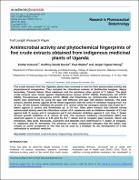Antimicrobial activity and phytochemical fingerprints of five crude extracts obtained from indigenous medicinal plants of Uganda
Date
2017Author
Katuura, Esther
Bbosa, Godfrey Sande
Waako, Paul
Ogwal-Okeng, Jasper
Metadata
Show full item recordAbstract
Five crude extracts from four Ugandan plants were screened in vitro for their antimicrobial activity and
phytochemical composition. They included the chloroform extracts of Bothliocline longipes, Maesa
lanceolata, Trimeria bakeri, Rhus natalensis and the petroleum ether extract of T. bakeri. The plant
crude extracts were tested against Staphylococcus aureus (ATCC 25923), Escherichia coli (ATCC
25922), Pseudomonas aeruginosa (ATCC 49619) and Entamoeba sp. Antimicrobial activities of the
plants were determined by using the agar well diffusion and agar well dilution methods. The plant
extracts showed activity against all the tested organisms with the zones of inhibition ranging from 4 to
19 mm. All the extracts inhibited the growth of S. aureus while the strongest activity was found for T.
bakeri against S. aureus and Entamoeba sp. at 19 mm. Other plant extracts that induced strong
antimicrobial activity were the chloroform extract of R. natalensis with an inhibition diameter of 13 mm
against both S. aureas and P. aeruginosa and 9 mm diameter inhibition against E. coli. Only T. bakeri
showed growth inhibition of S. aureus (4 mm). The minimum inhibitory concentration (MIC) was
observed against S. aureus at 0.25 g/ml by the T. bakeri and B. longipes plant extracts. Sterol and
triterpenes, fatty acids, flavanoids, coumarins and alkaloids were determined in T. bakeri, B. longipes,
R. natalensis and M. lanceolata. The presence of these compounds indicates that the plants may
contain an active compound or one that can be used as a template for the development of a new
antimalarial or antibiotic medicine.
Collections
- Research Articles [41]

